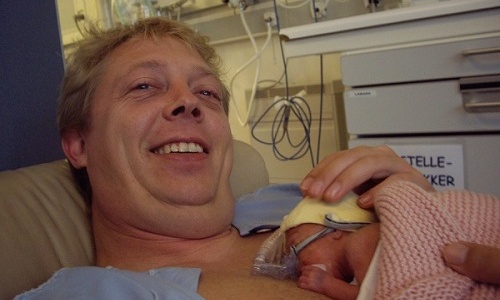Pregnancy Complications
Infant- and Family-Centered Developmental Care
Respiratory Infections
Neonatal Eye Health
Hygiene
Rare Diseases

How does a separation policy in the neonatal ward affect your role as the father of a preterm newborn? That’s what we asked Vilni Verner Holst Bloch.
Due to the preterm birth of his daughter, Vilni has been actively involved in the Norwegian parent organization Prematurforeningen for many years and is also a long-standing member of the GFCNI network.
The current separation policies introduced in hospitals around the world to protect patients and clinical staff from COVID-19 remind him of the time when he, too, was separated from his daughter—though back then, for very different reasons.
In this interview, he recalls the most challenging moments of that time and shares his advice for fathers and partners facing similar situations today due to visitation restrictions.
Question: Do you remember the situation when you and your partner became parents to a preterm baby?
Vilni Verner Holst Bloch:
Although this happened more than ten years ago, I still remember everything very clearly. My partner said she was feeling tired and had some pain, which was unusual for her. So I suggested she lie down and rest, thinking it was just normal stress or anxiety.
At the time, I was working as a public servant and had a 9-year-old son from a previous relationship. He had been born two weeks after his due date—a big baby delivered via emergency C-section. I never imagined that the birth of my second child could also be complicated—what were the odds?
This time, my daughter was born in week 26.
In fact, the chance of being born in week 26 is about 3.5 in 100, and the chance of being born in week 42 or later—like my son—is also about 3.5%.
Question: Your full-time job and the distance to the hospital were major obstacles to being with your partner and daughter in the NICU. How did that separation affect you in your role as a father and partner?
Vilni Verner Holst Bloch:
Being separated from both our tiny baby and my partner, while still going to work and caring for my older son, was extremely stressful. I was also very frustrated that I couldn’t be at the hospital more often, due to both work and the travel time.
We live about three hours away from the NICU—depending on transportation and traffic. With a young child who also needed care, and no family nearby to help, it was simply impossible to spend as much time in the hospital as I wanted.
This became especially challenging because my partner and our daughter had to stay in the hospital for several months.
Fortunately, my employer was very flexible, allowing me to take as many paid days off as possible within the rules.
I remember that doing Kangaroo Care was one of the most joyful moments for me—it brought me closer to my daughter and gave some relief to the mother as well. At the same time, it became a dilemma, because the hours for Kangaroo Care were often limited due to other circumstances at the hospital.
Question: What was the biggest challenge caused by this separation, emotionally and in practical terms?

Vilni Verner Holst Bloch:
As days become weeks, and weeks become months, you start to learn so much about the tiny life you hold on your chest. You begin to read the signs—when your baby feels comfortable, and when they don’t.
You’ll likely receive a lot of different information, sometimes even contradictory advice! My best advice is to trust your own capabilities as your baby’s caregiver, and never stop asking questions.
You’re under stress, so your memory may struggle to retain everything. That’s why I recommend asking for written information, so you can go over it later in quieter, calmer moments.
Also, accept your feelings. As fathers, we are often deeply affected by separation, and by the lack of opportunity to be there for our child and partner. Be aware of signs of depression, fatigue, or a sense of helplessness.
Question: Based on your personal experience, is there anything you would like to share with fathers who are or were separated from their child due to the pandemic?
Vilni Verner Holst Bloch:
Being separated from your child may be the hardest time of your life. It can feel like an emotional rollercoaster, and you may feel like you’re second to everyone else when it comes to caring for your baby.
If possible, ask for help—from family, friends, or healthcare professionals. Try to connect with other fathers who’ve gone through similar experiences.
Most importantly: Never stop talking about how you feel and what’s worrying you. Remember—you are the only and the best father for your child.
Thank you, Vilni Verner Holst Bloch, for your time and for sharing your experience and advice with us.
© 2025 GFCNI. All Rights Reserved.